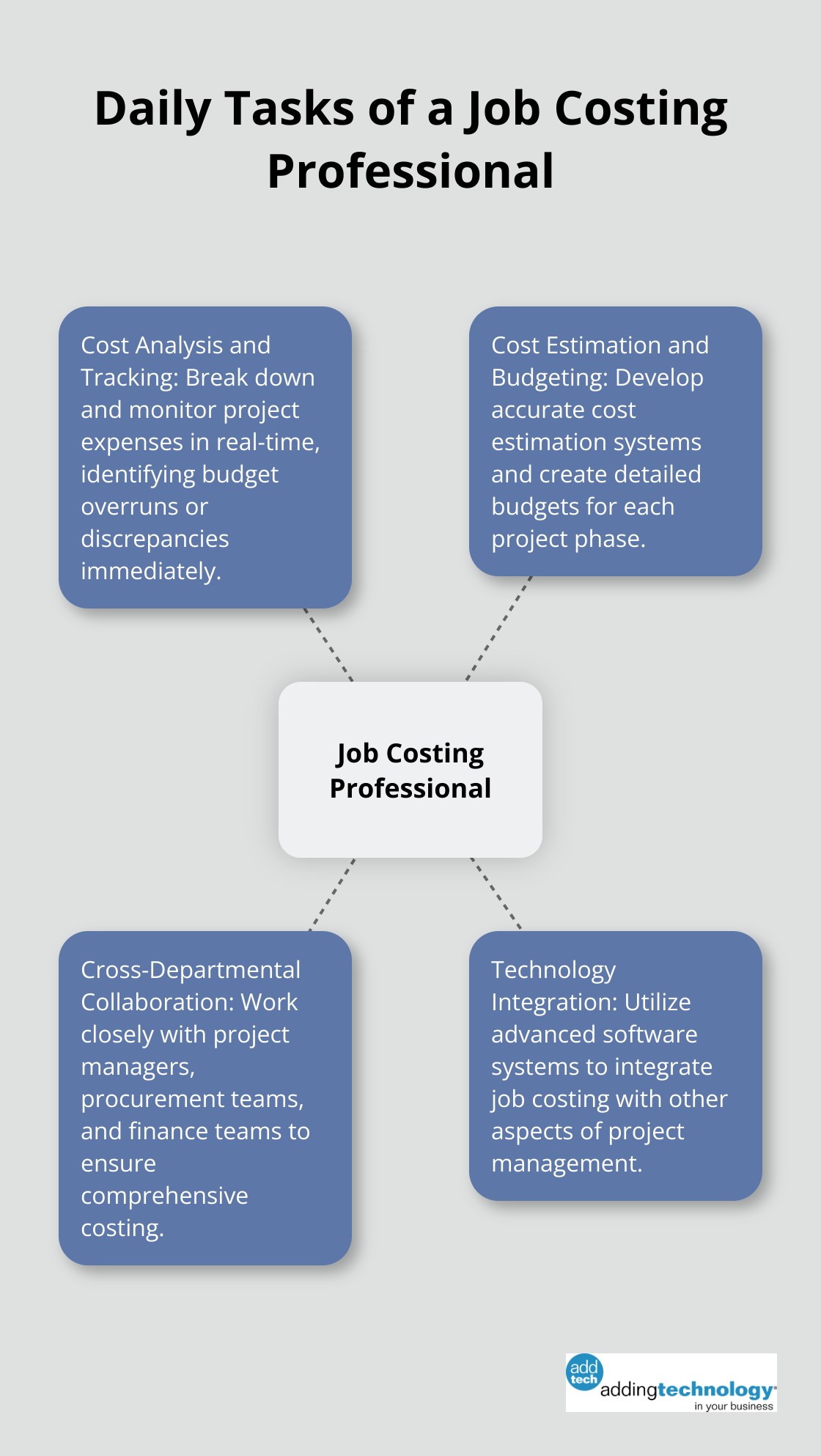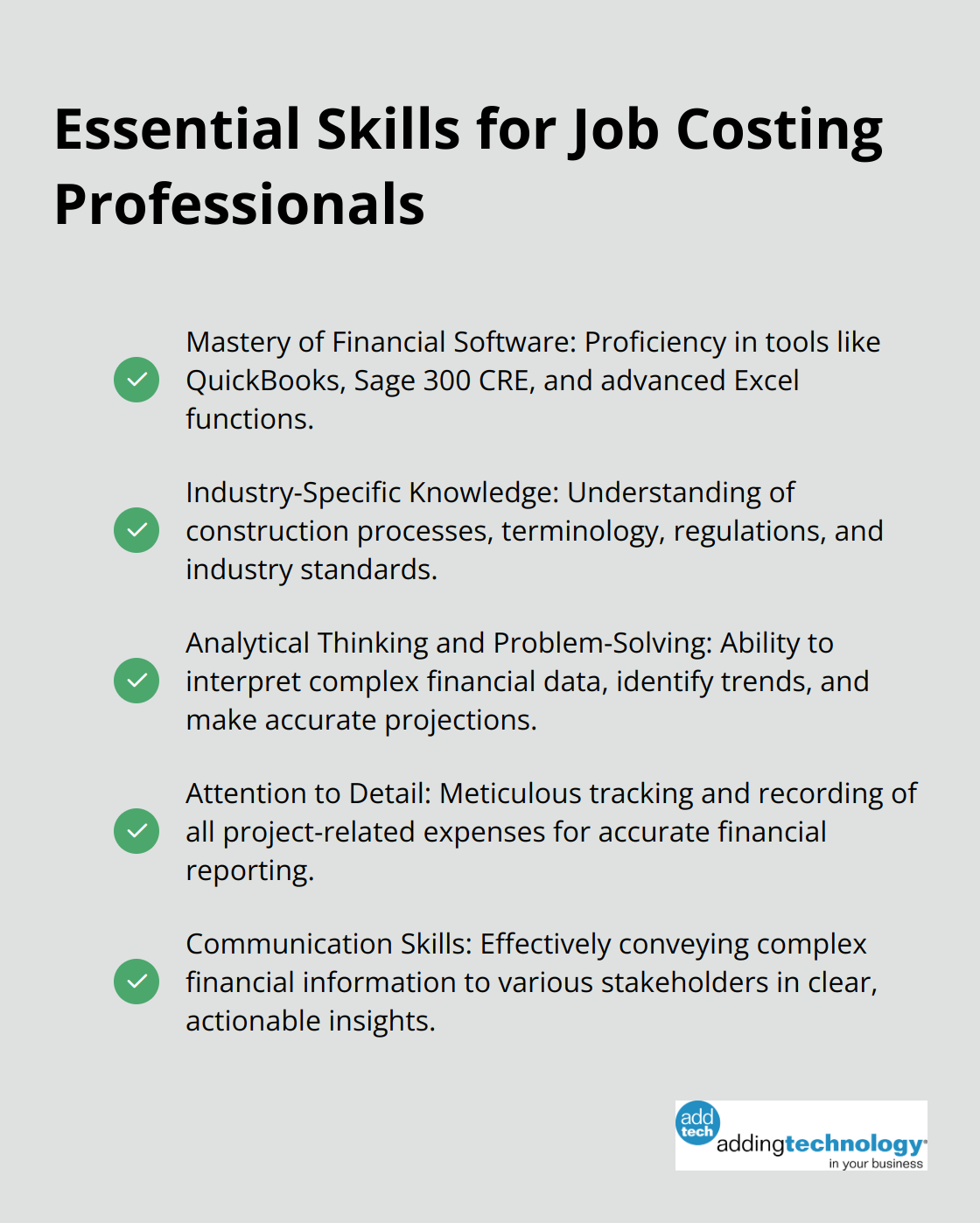
At adding technology, we understand the critical role of job costing in construction projects. A job costing professional’s responsibilities go far beyond simple number crunching.
This blog post will explore the costing job description, detailing the key tasks, skills, and qualifications required for this essential role. We’ll also examine how effective job costing can significantly impact project outcomes and financial success.
Job costing professionals analyze and track project costs as their primary task. They break down expenses into categories such as labor, materials, and overhead. These experts use specialized software to input and monitor costs in real-time, which allows them to identify budget overruns or discrepancies immediately.
For example, if material costs for a specific task exceed the estimate, the job costing professional flags this issue promptly. This quick action enables project managers to address the problem before it escalates (potentially saving thousands of dollars).
Job costing professionals develop and maintain accurate cost estimation systems. They create detailed budgets for each project phase, considering historical data, current market rates, and project-specific factors.
These experts also prepare comprehensive cost reports, which provide stakeholders with clear insights into the project’s financial health. These reports typically include variance analyses, comparing actual costs to budgeted amounts and explaining any significant differences.
Effective job costing requires close collaboration with various teams. Job costing professionals regularly interact with project managers to understand project scope and timelines. They work with procurement teams to negotiate better rates with suppliers and subcontractors. Finance teams rely on their input for accurate financial forecasting and reporting.
This collaborative approach ensures that all aspects of the project are considered in the costing process, leading to more accurate estimates and better financial outcomes. Construction joint work has been found to have a positive effect on cost and quality, with its impact best understood in relationship to the project’s overall outcomes.

Job costing professionals must stay up-to-date with the latest technology in their field. They often work with advanced software systems that integrate job costing with other aspects of project management. This integration allows for real-time data analysis and reporting, which is essential for making informed financial decisions.
At Adding Technology, we’ve observed that professionals who excel in this role often have a strong background in both accounting and construction technology. They understand how to leverage software tools to streamline processes and improve accuracy (a skill that’s becoming increasingly valuable in the construction industry).
The role of a job costing professional is multifaceted and requires a unique blend of skills. In the next section, we’ll explore the specific qualifications and abilities that make someone successful in this important position.
Job costing professionals must excel in accounting software and spreadsheets. They need proficiency in tools like QuickBooks, Sage 300 CRE, or industry-specific software such as Procore. Construction firms often use software for project tracking and job costing, and professionals in this field should be well-versed in these tools.
These professionals should also master advanced Excel functions (including pivot tables, VLOOKUP, and macros). These skills enable them to manipulate large datasets and create insightful reports efficiently.
A thorough understanding of construction processes, terminology, and regulations is vital. Job costing professionals must familiarize themselves with concepts like change orders, progress billing, and retainage. They should also stay current on industry standards set by organizations such as the Construction Financial Management Association (CFMA).
Knowledge of local and federal regulations (including labor laws and tax codes) is essential. This expertise ensures compliance and accurate cost allocation. Understanding prevailing wage requirements, for instance, can significantly impact labor cost calculations on government projects.

Strong analytical skills form the foundation of effective job costing. Professionals in this field must interpret complex financial data, identify trends, and make accurate projections. Job costing involves looking at direct and indirect costs, requiring a keen eye for detail and the ability to analyze various cost components.
Problem-solving skills become critical when addressing budget discrepancies or unexpected costs. A job costing professional might need to analyze why a particular task consistently exceeds the budget and propose solutions to mitigate these overruns.
Precision is paramount in job costing. Professionals must meticulously track and record all project-related expenses, no matter how small. This attention to detail ensures accurate financial reporting and helps prevent costly errors that could impact project profitability.
Job costing professionals must effectively communicate complex financial information to various stakeholders, including project managers, executives, and clients. They should translate financial jargon into clear, actionable insights that non-financial team members can understand and act upon.
The field of job costing continues to evolve alongside the construction industry. Professionals who adapt to new technologies and methodologies position themselves for success. In the next section, we’ll explore how effective job costing impacts construction projects and contributes to overall business success.
Job costing significantly improves financial accuracy in construction projects. It allows companies to track costs for each job meticulously, identifying exactly where money is spent and how it aligns with the budget. This level of detail enables more accurate profit calculations and helps identify potential cost overruns early.
The Construction Institute has identified best practices that, when executed effectively, lead to enhanced project performance. This improved accuracy directly translates to increased profitability and better financial health for construction firms.
Real-time cost data provided by job costing enables better decision-making throughout the project lifecycle. Project managers can quickly assess the financial impact of changes or delays, allowing them to make informed choices that protect the project’s bottom line.
If material costs for a specific component trend higher than expected, project leaders can explore alternative suppliers or materials before the issue significantly impacts the budget. This proactive approach to project management can lead to substantial cost savings and improved project outcomes.

Job costing data from previous projects serves as a valuable resource for preparing more accurate and competitive bids. Estimators can create bids that reflect real-world expenses and account for potential variables by analyzing historical cost information.
The Associated General Contractors of America reports that for nearly three years, the U.S. construction industry has been buffeted by unprecedented volatility in materials costs. This information can prove crucial in securing lucrative projects and sustaining business growth.
Detailed job costing information empowers construction companies during contract negotiations. With accurate cost data at their fingertips, negotiators can justify their pricing and defend against unreasonable client demands. This data-backed approach often results in more favorable contract terms and better protection against potential financial risks.
Effective job costing practices help construction firms identify areas where they can reduce costs without compromising quality. By analyzing detailed cost breakdowns, companies can spot inefficiencies, wasteful practices, or overpriced materials. These insights allow for targeted cost-cutting measures that can significantly improve overall project profitability.
Job costing professionals are essential for construction project success. Their responsibilities include cost analysis, budgeting, collaboration, and technology integration. The costing job description requires a unique skill set, combining financial expertise with industry knowledge and strong communication abilities.
Job costing enhances financial accuracy and empowers data-driven decision-making in construction. It revolutionizes bid preparation, improves contract negotiations, and identifies cost-saving opportunities. As the industry evolves, job costing adapts to new challenges and technologies (such as AI and cloud-based solutions).
Adding Technology offers expert services to streamline financial processes and ensure compliance for construction businesses. We empower contractors to make informed decisions, improve efficiency, and drive growth. Job costing professionals will continue to provide valuable financial insights, optimize resources, and contribute to strategic decision-making in the construction industry.









At adding technology, we know you want to focus on what you do best as a contractor. In order to do that, you need a proactive back office crew who has financial expertise in your industry.
The problem is that managing and understanding key financial compliance details for your business is a distraction when you want to spend your time focused on building your business (and our collective future).
We understand that there is an art to what contractors do, and financial worries can disrupt the creative process and quality of work. We know that many contractors struggle with messy books, lack of realtime financial visibility, and the stress of compliance issues. These challenges can lead to frustration, overwhelm, and fear that distracts from their core business.
That's where we come in. We're not just accountants; we're part of your crew. We renovate your books, implement cutting-edge technology, and provide you with the real-time job costing and financial insights you need to make informed decisions. Our services are designed to give you peace of mind, allowing you to focus on what you do best - creating and building.
Here’s how we do it:
Schedule a conversation today, and in the meantime, download the Contractor’s Blueprint for Financial Success: A Step by-Step Guide to Maximizing Profits in Construction.” So you can stop worrying about accounting, technology, and compliance details and be free to hammer out success in the field.